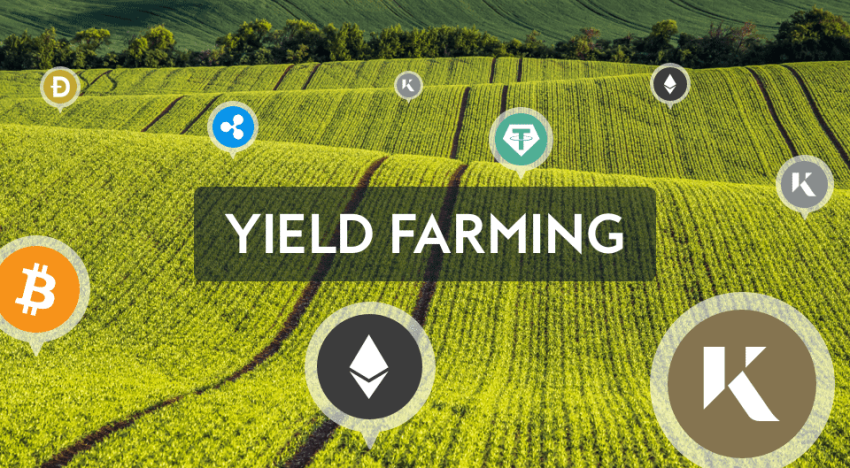Introduction
Yield farming has emerged as a popular activity within the decentralized finance (DeFi) ecosystem, offering the potential for attractive returns on invested assets. However, this innovative practice is not without risks. In recent times, the rise of rug pull scams has shed light on the dark side of yield farming, exposing vulnerabilities that investors need to be aware of. This article explores the risks associated with yield farming and the susceptibility to rug pull scams, providing insights to help investors navigate this landscape safely.
Understanding Yield Farming
Yield farming, also known as liquidity mining, involves depositing funds into DeFi protocols to earn rewards in the form of additional tokens or fees. Participants contribute their assets as liquidity, which facilitates various decentralized finance activities such as lending, borrowing, and trading. In return for providing liquidity, users receive tokens representing their share in the platform’s revenue or governance.
Risks Associated with Yield Farming
- Smart Contract Vulnerabilities: Yield farming relies on smart contracts that automate transactions and distribute rewards. However, these contracts can contain coding flaws or vulnerabilities that malicious actors can exploit to manipulate funds or drain liquidity pools.
- Impermanent Loss: Impermanent loss occurs when the value of deposited assets diverges from the value of the liquidity pool due to price volatility. This loss arises when assets are withdrawn at an unfavorable exchange rate, resulting in a net loss compared to holding the assets without providing liquidity.
- Market Volatility: Yield farming often involves exposure to volatile cryptocurrencies or tokens. Fluctuating prices can impact the value of rewards received, potentially leading to diminished returns or losses if not managed carefully.
- Imperfect Information: The DeFi space is dynamic, with new protocols and tokens constantly emerging. It can be challenging to assess the legitimacy and long-term viability of projects, making it crucial to conduct thorough research before participating in yield farming activities.
Rug Pull Scams in Yield Farming

Rug pull scams pose a significant threat to participants in yield farming. These scams involve deceptive practices where project developers or liquidity providers abruptly abandon the project, drain liquidity from the pools, and leave investors with worthless tokens. Yield farming platforms with inadequate security measures or lax listing requirements become prime targets for such fraudulent activities.
Vulnerabilities to Rug Pull Scams
- Low Liquidity Pools: Yield farming platforms with low liquidity are particularly susceptible to rug pull scams. The absence of sufficient liquidity makes it easier for malicious actors to manipulate the token price and execute an exit strategy, leaving investors with significant losses.
- Limited Due Diligence: Some yield farming platforms may have minimal requirements for project listings, leading to the inclusion of potentially fraudulent projects. Investors should exercise caution and conduct thorough due diligence to evaluate the legitimacy and credibility of the projects they engage with.
- Anonymous Developers: Rug pull scams often involve anonymous or pseudonymous developers who conceal their identities and intentions. This lack of transparency makes it difficult for investors to assess the credibility and trustworthiness of the individuals behind the project.
Mitigating Risks and Protecting Investments
- Conduct Thorough Research: Prioritize comprehensive research before participating in yield farming. Evaluate the project’s team, technology, audits, community engagement, and tokenomics. Look for red flags, such as unrealistic promises, anonymous developers, or questionable token distribution.
- Diversify Investments: Spread investments across multiple yield farming protocols and projects to minimize the impact of potential rug pulls or impermanent losses. Diversification helps mitigate the risk of a single project adversely affecting the overall portfolio.
- Assess Security Measures: Choose yield farming platforms that prioritize security and implement robust measures such as smart contract audits, bug bounties, and partnerships with reputable security firms. Platforms that proactively address security concerns provide a safer environment for investors.
- Stay Informed: Continuously monitor the latest news, developments, and community discussions within the DeFi space. Staying informed can help identify emerging risks, spot warning signs, and make informed decisions.
Evaluating Tokenomics and Sustainability
Token Distribution and Governance
Examining the tokenomics of yield farming projects is crucial to assess their long-term sustainability. Evaluate factors such as token distribution, inflationary or deflationary mechanisms, and the role of governance tokens in decision-making. Projects with fair token distribution and clear governance structures are generally more transparent and sustainable.
Sustainable APYs and Rewards
High Annual Percentage Yields (APYs) and rewards can be enticing in yield farming, but it’s essential to evaluate their sustainability. Projects that offer excessively high returns may not be sustainable in the long run and could be a red flag for potential scams or unsustainable farming strategies. Look for projects that strike a balance between attractive yields and realistic, sustainable rewards.
Due Diligence and Risk Management Strategies
Audits and Security Assessments
Prioritize yield farming projects that undergo comprehensive audits and security assessments from reputable firms. Audits help identify potential vulnerabilities in smart contracts and enhance the overall security of the platform. Projects that are transparent about their audit reports demonstrate a commitment to investor protection.
Setting Risk Parameters and Exit Strategies
Developing risk management strategies is essential when participating in yield farming. Set clear risk parameters, such as the maximum percentage of your portfolio allocated to yield farming, and establish exit strategies to protect against potential losses. Implementing stop-loss mechanisms or regularly rebalancing your portfolio can help manage risks effectively.
Community Engagement and Reputation
Evaluating Community Support
Assess the level of community engagement and support for yield farming projects. Engaged communities actively contribute to the project’s growth and security. Look for projects with active social media channels, reputable community members, and positive sentiment within the community.
Reputation and Track Record
Consider the reputation and track record of the project team and developers. Prioritize projects with experienced teams who have successfully launched and maintained previous DeFi projects. A solid reputation and a history of delivering on promises are positive indicators of a project’s credibility.
The Importance of Continuous Monitoring
Regularly Assessing Project Updates
Stay updated with the latest project developments, roadmap updates, and governance proposals. Regularly review project announcements, blog posts, and community discussions to assess the ongoing progress and direction of the yield farming project. This information can help you make informed decisions about your investments.
Monitoring Market Conditions
Keep a close eye on market conditions, including overall cryptocurrency market trends and regulatory changes. Understanding the broader market landscape can provide insights into potential risks and opportunities that may impact yield farming projects. Stay informed to adapt your strategies accordingly.
Risk Mitigation Strategies for Yield Farmers
Impermanent Loss Hedging
Investors can employ hedging strategies to mitigate the impact of impermanent loss. Options such as impermanent loss insurance or utilizing liquidity pool aggregators that automatically rebalance holdings can help reduce potential losses during periods of high volatility.
Stop-Loss Mechanisms and Monitoring Tools
Implementing stop-loss mechanisms and utilizing monitoring tools can help protect investments in yield farming. Setting predefined thresholds for price or value fluctuations can automatically trigger the sale of assets to limit potential losses. Monitoring tools can provide real-time alerts and notifications to stay informed about changes in the market or project dynamics.
Governance and Transparency in Yield Farming Platforms
Transparent Governance Processes
Yield farming platforms that prioritize transparency in their governance processes inspire trust and confidence among investors. Clear and transparent decision-making mechanisms, community voting, and public disclosure of governance proposals and changes foster a sense of inclusivity and allow stakeholders to actively participate in shaping the platform’s direction.
Auditing Governance and Smart Contracts
Auditing the governance mechanisms and smart contracts of yield farming platforms is crucial to ensure their integrity and security. Independent audits of the governance system help identify vulnerabilities or potential risks associated with voting mechanisms or token distribution. Audits provide assurance to investors and contribute to a more secure and trustworthy yield farming environment.
Regulatory Landscape and Compliance Considerations
Regulatory Compliance and Investor Protection
As the DeFi industry evolves, regulatory frameworks and compliance requirements are likely to be established. Yield farming platforms that proactively embrace regulatory compliance measures demonstrate a commitment to investor protection and long-term sustainability. Compliance with Know Your Customer (KYC) and Anti-Money Laundering (AML) regulations can enhance the credibility and security of the platform.
Collaborating with Regulators and Industry Associations
Yield farming platforms can foster stronger relationships with regulators and industry associations to shape regulations that address the risks and challenges of the industry. Collaborative efforts can lead to the development of standards, best practices, and guidelines that enhance investor protection and promote responsible practices in yield farming.
Continued Innovation and Evolution of Yield Farming
New Strategies and Opportunities
Yield farming continues to evolve, with new strategies and opportunities emerging regularly. Staying informed about innovative approaches, such as algorithmic stablecoin farming or innovative tokenomic models, can provide investors with early access to potentially lucrative opportunities while considering the associated risks.
Collaboration and Knowledge Sharing
Encouraging collaboration and knowledge sharing within the yield farming community can drive innovation and improve risk management practices. Platforms, developers, and investors can collectively share insights, lessons learned, and best practices, fostering a more robust and resilient yield farming ecosystem.
Conclusion
Yield farming presents an exciting opportunity for investors to earn attractive returns within the DeFi ecosystem. However, it is essential to understand and mitigate the associated risks. Rug pull scams and vulnerabilities within yield farming platforms highlight the importance of due diligence, diversification, and vigilance. By conducting thorough research, diversifying investments, and staying informed, investors can navigate the world of yield farming with greater confidence and protect their hard-earned assets.
I’m a highly experienced and well-respected author in the field of Cryptocurrency. I have been writing on the subject for over 5 years now and have become an expert in the field. My work has been featured in many prestigious publications, including The Wall Street Journal, Forbes, and Business Insider. I’m a regular contributor to CoinDesk, one of the leading sources of Cryptocurrency news and information. In addition to my writing, I’m also a highly sought-after speaker on the topic of Cryptocurrency investing and trading. I have been invited to speak at numerous events around the world, including the World Economic Forum in Davos, Switzerland.

